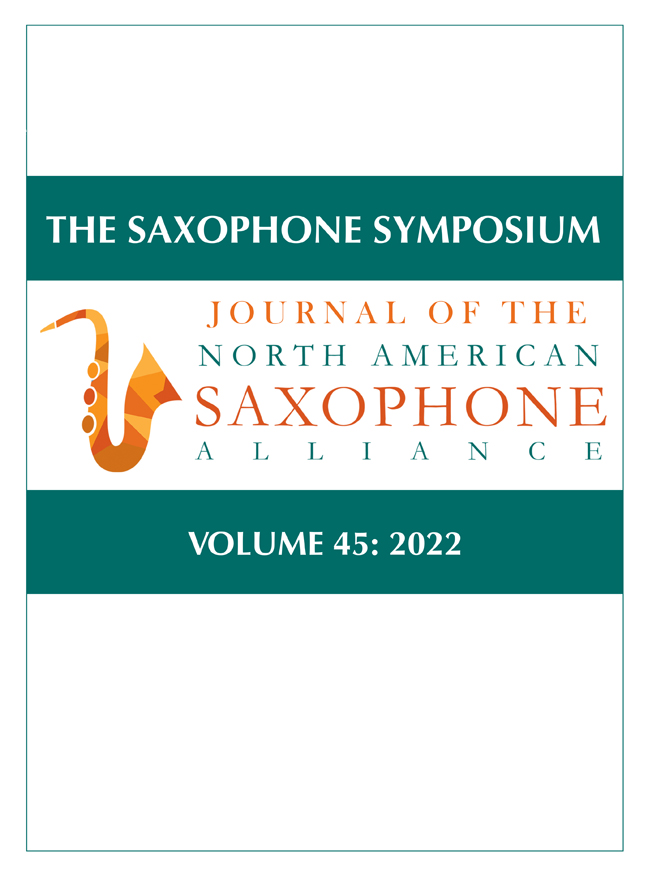Book contents
- Frontmatter
- Contents
- The Saxophone Symposium
- Nasa Executive Committee
- Notice to Contributors
- Financial Reports
- Book part
- List of Featured Concerto Performers at North American Saxophone Alliance Biennial Conferences, 1994–2020
- Asenath Mann: Boston's Gilded-Age Saxophonist
- Zechariah Goh and the Development of Classical Saxophone in Singapore
- Mrs. B. L. Hackenberger: Bessie Mecklem as Progressive-Era Clubwoman
- Elise Hall in Santa Barbara (1889–1898): The Amateur Musical Club and Philharmonic Society
- “Another American Voice” William Grant Still and the Saxophone
- The Manuscript to Jacques Ibert's Concertino da Camera: What We Can Learn from It
- Steven Bryant: In this Broad Earth
- Marco Albonetti, Amarcord d’un Tango
- Contributor Biographies
“Another American Voice” William Grant Still and the Saxophone
Published online by Cambridge University Press: 15 February 2024
- Frontmatter
- Contents
- The Saxophone Symposium
- Nasa Executive Committee
- Notice to Contributors
- Financial Reports
- Book part
- List of Featured Concerto Performers at North American Saxophone Alliance Biennial Conferences, 1994–2020
- Asenath Mann: Boston's Gilded-Age Saxophonist
- Zechariah Goh and the Development of Classical Saxophone in Singapore
- Mrs. B. L. Hackenberger: Bessie Mecklem as Progressive-Era Clubwoman
- Elise Hall in Santa Barbara (1889–1898): The Amateur Musical Club and Philharmonic Society
- “Another American Voice” William Grant Still and the Saxophone
- The Manuscript to Jacques Ibert's Concertino da Camera: What We Can Learn from It
- Steven Bryant: In this Broad Earth
- Marco Albonetti, Amarcord d’un Tango
- Contributor Biographies
Summary
Abstract
This article will explore the life and works of William Grant Still, especially as they relate to the saxophone. His familiar solo piece for alto saxophone and piano, Romance, and its little-known complement Quit Dat Fool’nish will be examined, along with his early chamber works utilizing the instrument. In addition, select orchestral scores by Still that include the saxophone will be explored. Throughout, the works will be placed within their chronological context in Still's life, and where possible, within the framework of his personal and artistic philosophies.
Keywords: William Grant Still, Sigurd Raschèr, American Music, 20th Century Music
Introduction
Who was William Grant Still? Instead of viewing him as the “Dean of Afro-American Composers” (a title which Still viewed with more than a little distaste), the composer should be understood from his preferred vantage point: as “another American voice.” 2 This article will explore this important musician's life and work, especially as they relate to the saxophone. His familiar solo piece for alto saxophone and piano, Romance, and its littleknown complement Quit Dat Fool’nish will be examined, along with his early chamber works that utilize the instrument. In addition, select orchestral scores by Still that include the saxophone will be explored. Throughout, the works will be placed within their chronological context in Still's life, and where possible, within the framework of his personal and artistic philosophies.
William Grant Still was often labeled the “Dean of Afro-American Composers,” but (perhaps obviously from this paternalistic title) he battled racism and discrimination in the classical music community throughout his career. He held an impressive number of distinctions: he was the first African American to have a symphony publicly performed in the United States, the first African American to conduct a major orchestra, the first African American to have an opera staged by a major company, and the first African American to conduct a white orchestra in the American South. He composed voluminously, writing nine operas, five symphonies, four ballets, and more than one hundred and fifty other works. However, even with these distinctions and a seemingly unquenchable depth of musical inspiration, Still struggled to have much of his music performed in his own lifetime.
Personally, Still was a quiet, gentle man. He was uncomfortable in most social situations, and he vastly preferred written communication to speaking face-to-face.
- Type
- Chapter
- Information
- The Saxophone SymposiumJournal of the North American Saxophone Alliance, pp. 94 - 111Publisher: Boydell & BrewerFirst published in: 2024



